Are you sure that your mathematical and algorithmical approach to the problem is correct?
I hit exactly same problem where Fisher–Yates shuffle will be bottleneck in corner cases. But for me the real problem is brute force algorithm that doesn't scale well to all problems. Following story explains the problem and optimizations that I have come up with so far.
Dealing cards for 4 players
Number of possible deals is 96 bit number. That puts quite a stress for random number generator to avoid statical anomalies when selecting play plan from generated sample set of deals. I choose to use 2xmt19937_64 seeded from /dev/random because of the long period and heavy advertisement in web that it is good for scientific simulations.
Simple approach is to use Fisher–Yates shuffle to generate deals and filter out deals that don't match already collected information. Knuth shuffle takes ~1400 CPU cycles per deal mostly because I have to generate 51 random numbers and swap 51 times entries in the table.
That doesn't matter for normal cases where I would only need to generate 10000-100000 deals in 7 minutes. But there is extreme cases when filters may select only very small subset of hands requiring huge number of deals to be generated.
Using single number for multiple cards
When profiling with callgrind (valgrind) I noticed that main slow down was C++ random number generator (after switching away from std::uniform_int_distribution that was first bottleneck).
Then I came up with idea that I can use single random number for multiple cards. The idea is to use least significant information from the number first and then erase that information.
int number = uniform_rng(0, 52*51*50*49);
int card1 = number % 52;
number /= 52;
int cards2 = number % 51;
number /= 51;
......
Of course that is only minor optimization because generation is still O(N).
Generation using bit permutations
Next idea was exactly solution asked in here but I ended up still with O(N) but with larger cost than original shuffle. But lets look into solution and why it fails so miserably.
I decided to use idea Dealing All the Deals by John Christman
void Deal::generate()
{
// 52:26 split, 52!/(26!)**2 = 495,918,532,948,1041
max = 495918532948104LU;
partner = uniform_rng(eng1, max);
// 2x 26:13 splits, (26!)**2/(13!)**2 = 10,400,600**2
max = 10400600LU*10400600LU;
hands = uniform_rng(eng2, max);
// Create 104 bit presentation of deal (2 bits per card)
select_deal(id, partner, hands);
}
So far good and pretty good looking but select_deal implementation is PITA.
void select_deal(Id &new_id, uint64_t partner, uint64_t hands)
{
unsigned idx;
unsigned e, n, ns = 26;
e = n = 13;
// Figure out partnership who owns which card
for (idx = CARDS_IN_SUIT*NUM_SUITS; idx > 0; ) {
uint64_t cut = ncr(idx - 1, ns);
if (partner >= cut) {
partner -= cut;
// Figure out if N or S holds the card
ns--;
cut = ncr(ns, n) * 10400600LU;
if (hands > cut) {
hands -= cut;
n--;
} else
new_id[idx%NUM_SUITS] |= 1 << (idx/NUM_SUITS);
} else
new_id[idx%NUM_SUITS + NUM_SUITS] |= 1 << (idx/NUM_SUITS);
idx--;
}
unsigned ew = 26;
// Figure out if E or W holds a card
for (idx = CARDS_IN_SUIT*NUM_SUITS; idx-- > 0; ) {
if (new_id[idx%NUM_SUITS + NUM_SUITS] & (1 << (idx/NUM_SUITS))) {
uint64_t cut = ncr(--ew, e);
if (hands >= cut) {
hands -= cut;
e--;
} else
new_id[idx%NUM_SUITS] |= 1 << (idx/NUM_SUITS);
}
}
}
Now that I had the O(N) permutation solution done to prove algorithm could work I started searching for O(1) mapping from random number to bit permutation. Too bad it looks like only solution would be using huge lookup tables that would kill CPU caches. That doesn't sound good idea for AI that will be using very large amount of caches for double dummy analyzer.
Mathematical solution
After all hard work to figure out how to generate random bit permutations I decided go back to maths. It is entirely possible to apply filters before dealing cards. That requires splitting deals to manageable number of layered sets and selecting between sets based on their relative probabilities after filtering out impossible sets.
I don't yet have code ready for that to tests how much cycles I'm wasting in common case where filter is selecting major part of deal. But I believe this approach gives the most stable generation performance keeping the cost less than 0.1%.

